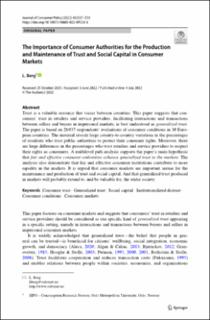The Importance of Consumer Authorities for the Production and Maintenance of Trust and Social Capital in Consumer Markets
Peer reviewed, Journal article
Published version
Permanent lenke
https://hdl.handle.net/11250/3050747Utgivelsesdato
2022-07-04Metadata
Vis full innførselSamlinger
Originalversjon
Journal of Consumer Policy. 2022, 45 (3), 537-559. https://doi.org/10.1007/s10603-022-09523-6Sammendrag
Trust is a valuable resource that varies between countries. This paper suggests that consumers’ trust in retailers and service providers, facilitating interactions and transactions between sellers and buyers in impersonal markets, is best understood as generalized trust. The paper is based on 28 037 respondents’ evaluations of consumer conditions in 30 European countries. The material reveals large country-to-country variations in the percentages of residents who trust public authorities to protect their consumer rights. Moreover, there are large differences in the percentages who trust retailers and service providers to respect their rights as consumers. A multilevel path analysis supports the paper’s main hypothesis that fair and effective consumer authorities enhance generalized trust in the markets. The analyses also demonstrate that fair and effective consumer institutions contribute to more equality in the markets. It is argued that consumer markets are important arenas for the maintenance and production of trust and social capital. And that generalized trust produced in markets will probably extend to, and be valuable for, the wider society.
Utgiver
SpringerSerie
Journal of Consumer Policy;Volume 45, issue 3Tidsskrift
Journal of Consumer PolicyOpphavsrett
© The Author(s) 2022Beslektede innførsler
Viser innførsler beslektet ved tittel, forfatter og emneord.
-
Clothes and consumer behaviour: changing consumers purchase through raising awareness for durability
Brokstad, Vanessa Myrtle (MAPD;2019, Master thesis, 2019)This master’s thesis has been about how we, as consumers, can be better equipped to make purchases for long-lasting clothes, to do so, we must change our behavior. The first priority is to reduce the growing consumption ... -
Consumer practices and prevalence of Campylobacter, Salmonella and norovirus in kitchens from six European countries
Møretrø, Trond; Nguyen-The, Christophe; Didier, Pierrine; Maître, Isabelle; Izsó, Tekla; Kasza, Gyula; Skuland, Silje Elisabeth; Cardoso, Maria Joao; Ferreira, Vânia B.; Teixeira, Paula; Borda, Daniela; Dumitrascu, Loredana; Neagu, Corina; Nicolau, Anca Ioana; Anfruns-Estrada, Eduard; Foden, Mike; Voysey, Phil; Langsrud, Solveig (International journal of food microbiology;volume 347, Peer reviewed; Journal article, 2021-03-26)About 40% of foodborne infections are acquired in the home. The aim of the present study was to track contamination of pathogens during domestic food preparation and link the contamination to preparation practices. Research ... -
Consumer Readiness to Reduce Meat Consumption for the Purpose of Environmental Sustainability: Insights from Norway
Austgulen, Marthe Hårvik; Skuland, Silje Elisabeth; Schjøll, Alexander; Alfnes, Frode (Sustainability;Volume 10, Issue 9, Journal article; Peer reviewed, 2018-08-28)Food production is associated with various environmental impacts and the production of meat is highlighted as a significant source of greenhouse gas emissions. A transition toward plant-based and low-meat diets has thus ...

